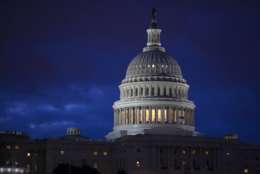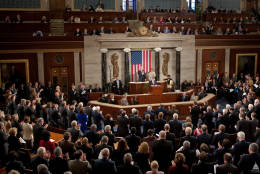appropriations
-
The government is still closed and some federal employees are furloughed. Nicole Ogrysko explains what federal employees could expect today.
January 22, 2018 -
The answer to the question in the headline is that we should all care, because it is certainly no way to run a business, or a government.
January 09, 2018 -
Soon members of Congress will return to the Hill to tackle the great issues of 2018 — besides getting re-elected, that is.
December 28, 2017 -
Pay freeze for certain political officials has been extended by legislation, according to OMB memo. Those affected will be barred from pay increases past executive 2013 levels until the end of the calendar year through Jan. 6, 2018.
May 17, 2017 -
Based on what’s happened so far in 2017, budget expert Stan Collender said the administration is already behind schedule on budgets and appropriations as far ahead as 2019, and the tactics Republican lawmakers are using make catching up unlikely.
May 16, 2017 -
The election may be over, but federal employees still face uncertainty on a number of key issues, not least of which is how the government will be funded.
November 10, 2016 -
The White House has threatened to veto a fiscal 2017 spending bill that would further cut the Internal Revenue Service's budget by $236 million.
June 23, 2016 -
What federal employees should know about the $1 trillion, 1,603-page spending bill for fiscal 2015.
December 10, 2014 -
While there's much speculation about how Republicans will run Capitol Hill in the next Congress, the lame-duck one that returns to Washington today must tackle big challenges of its own. With a continuing resolution set to expire in mid-December, agency budgets hang in the balance.
November 12, 2014 -
The appropriations process was supposed to be easier this year compared to last, because lawmakers had signed off on a bipartisan deal that set top-line spending levels for the next two years. But action in both the House and the Senate appears to have largely stalled.
July 07, 2014 -
The House is beating the Senate five to nothing in the race to pass next year's appropriations bills. The topline spending amounts for federal agencies are already set, but even so Congress isn't exactly sprinting to finalize the budgets. But the clock is still ticking and September 30th is only about three months away. David Hawkings is Senior Editor of Roll Call. He explained where Congress stands in the appropriations process on In Depth with Francis Rose.
July 07, 2014 -
Congress has until Sept. 30 to deliver a complete fiscal 2015 budget plan setting agency funding levels. Track the progress of your agency's 2013 appropriations bill.
May 29, 2014 -
After a month of negotiations, the leaders of the House and Senate Appropriations Committees unveiled a massive $1.1 trillion spending bill this week funding the government for the remainder of fiscal 2014. From federal pay and benefits to a further decline in the Internal Revenue Service's budget, read about three key takeaways of the bill.
January 14, 2014 -
Republican leaders plan to pass a short-term funding bill this week to extend by three days the deadline for wrapping up a massive, $1 trillion-plus catch-all spending bill covering funding for the rest of the year. The short-term measure would give lawmakers until midnight next Saturday to pass the larger funding bill. The current stopgap funding bill expires at midnight on Wednesday.
January 13, 2014 -
Congress returns to work today with a crowded agenda and little time. Lawmakers must come to agreement on 2014 funding before the fiscal year ends Sept. 30 or risk a government shutdown. Also on the agenda: coming up with an alternative to the automatic spending constraints known as sequestration and negotiating a raise in the government's borrowing limit. There are also other measures affecting federal employees that remain to be worked out, including legislation to overhaul the cash-strapped Postal Service and a potential 1 percent pay raise for civilian federal workers.
September 06, 2013









